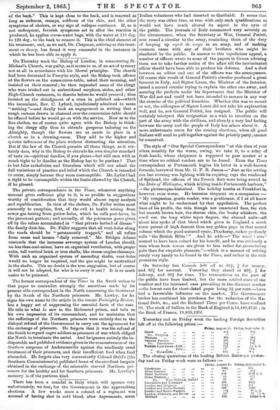There has been a scandal in Italy which will operate
very unfortunately, we fear, for the Government in the approaching elections. A few weeks since a colonel of a regiment was accused of having shot in cold blood, after .Aspromonte, seven Italian volunteers who had deserted to Garibaldi. It seems that the story was either true, or true with only such qualifications as would not have much altered its aspect in the eyes of the public. The journals of Italy commented very severely on the circumstance, when the Secretary at War, General Petitti, sent round a circular to the army, reminding them of the duty of keeping up esprit cle corps in an army, and of making common cause with any of their brethren who might be slandered by the public. In answer to this injudicious appeal, a number of officers wrote to some of the papers in Genoa advising them not to take further notice of the affair till the incriminated officer should have been able to produce his defence. And a duel between an editor and one of the officers was the consequence. Of course this result of General Petitti's circular produced a great ferment in Italy, and Signor Lanza, the Minister of the Interior, issued a second circular trying to explain the other one away, and assuring the prefects under his department that the Minister of War did not and could not have intended to menace in any way the exercise of the political franchise. Whether this was so meant or not, the colleagues of Signor Lanza did not take his explanation well, and he, not General Petitti, has resigned. The public will certainly interpret this resignation as a wish to interfere on the part of the army with the civilians, and already a very bad feeling between the army and the people of Italy has arisen about it. A more unfortunate omen for the coming elections, when all good Italians will need to pull together against the priestly party, cannot be conceived.






























 Previous page
Previous page